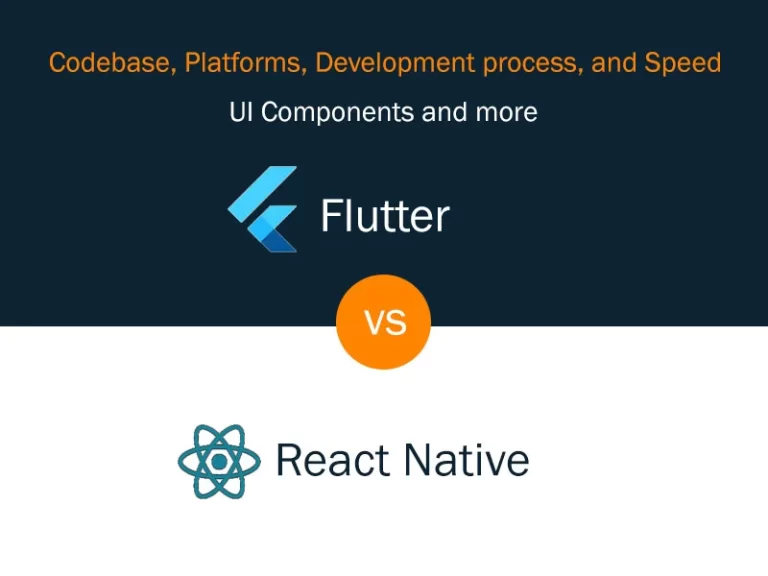Flutter vs React Native: Which one is better for 2023?

Hybrid apps are the new trend these days. It becomes harder to choose the right technology for your cross-platform app. There are two most popular technologies out there that developers love.
This is a complete comparison between Flutter and React Native. We will consider all the factors to choose the software technology for you. The battle will start with the basic overview and go through factors such as performance, features, hiring IT company, community, and many more.
By the end of the guide, you will have a complete idea of which technology is preferable for you.
Overview of Flutter vs React Native
Flutter is a tech developed by Google where you can develop apps for all platforms. It not only supports mobile apps across all the OS but you can also create web apps and desktop apps. The support is amazing as they are developed by Google. Flutter came into the market in May 2017. However, it was first described back in 2015.
React Native is also developed by the tech giant Meta Platforms (previously known as Facebook). Even they allow you to develop any apps that you want including mobile apps, Windows apps, Mac apps, Shopify apps, and many more. The JS framework was first released in 2015. So, as compared to Flutter, React Native is pretty old. Their desktop platform is handled by Microsoft Corporation.
Now that you know the overview of both technologies, let’s see other factors.
Codebase, Platforms, Development Process, and Speed
(a) Codebase
They both have a single codebase for all the platforms. You don’t need to worry about writing another code for any platform.
Flutter uses Dart language for programming. Therefore, to develop the apps, you will have to learn Dart. The technology was written in Dart, C/C++.
On the other hand, React Native is a javascript framework. So, to code in React Native, you will have to learn Javascript. React Native was written in multiple programming languages which includes JavaScript, Java, C++, Objective-C, and Python.
(b) Platforms
It’s a cross-platform app where you can develop apps for almost all popular platforms. Here’s a detailed comparison of the platforms supported.
- The supported platforms for Flutter include Android, iOS, Google Fuchsia, Web platform (the web version), Linux (almost all distro), macOS, and Windows.
- You can run React Native apps on Android, Android TV (all versions), iOS (iPad included), macOS, tvOS, Web, Windows, UWP, and VR.
As React Native is developed by Meta Platforms, you will get better functionalities to create Oculus apps.
(c) Development Process and Speed
The development process is fast on both of the platforms. However, when it comes to speed, Flutter apps tend to have a slightly better speed as compared to React Native. Especially, if you are creating apps for mobile, Flutter will provide far better speed.
As Flutter is powered by Google, you can use their default IDE (android studio) for developing mobile apps. On the other hand, if you are familiar with other IDE, you can also use Visual Code which has a Flutter extension.
React Native doesn’t have any official IDE. People often use Visual Code, Web Storm, or android studio for coding and development.
The learning process is easier for both. However, if a developer is already familiar with Javascript, React Native is slightly easier to learn and implement.
Features (UI Components and more)
You will get amazing features on both platforms. There are a few similarities and differences between them.
To begin with, there comes a hot reload feature in Flutter that allows developers to code in real time. In the same way, there is a hard refresh button in React Native which provides a similar capability.
UI Components
When it comes to coding, Flutter uses a reactive programming paradigm. They have pre-defined components which are fully customizable. The documentation is slightly less detailed. However, they are improving the documentation as time passes. It’s quite easier and faster to create or edit UI components. However, it’s still harder to create complex components.
React Native uses a declarative programming style. By this, the components look great on all the devices. Coming to customization, React Native uses standardized components. So, it becomes harder to create components. Proper UI and JS knowledge is required to make the customizations and create UI components. It’s more time-consuming as compared to Flutter.
Libraries and Updates
When it comes to libraries, both tools have some of the best libraries you can use. In the same way, these libraries get depreciated when they are no longer performing. In simple words, the library you used will no longer work. Instead, they are replicated with new libraries or alternative apps that give better performance or more features. So, you don’t need to worry about depreciation.
If you compare both technologies, React Native has slightly more libraries that are left behind or abandoned. So, you are more likely to come across libraries in React Native rather than Flutter.
Updates are necessary when you are using tech as your primary codebase. Both React Native and Flutter provide regular updates with new and exciting features. The performance is increasing as well as there are more features added. With the new updates, it’s getting easier to develop apps with these technologies.
Hiring Developers and Pricing
Now, let’s talk about hiring developers and the cost of creating the apps.
Flutter is still newer as compared to others. As it requires Dart language, there are fewer developers as compared to React Native. Therefore, it becomes harder to hire developers in Flutter.
On the other hand, React Native developers are easier to find as Javascript is a very popular language. With this, you can easily find developers working on React Native.
Coming to the Pricing
The cost depends on the developers or the team of developers you hire. Depending on the company, country, experience of the developers, and complexity of your project, developers will charge you. However, if we take a general comparison, Flutter developers charge more compared to React Native developers. The core reason behind the high pricing is the lack of developers. As there are fewer developers available, they tend to charge more.
Community
You will need a community that helps you if something goes wrong. When developing complex apps, community support is mandatory as it will help you in solving bigger problems. For a small to mid-level enterprise, you should always check the community before you go ahead with the technology. The same goes if you are a developer.
React Native has a large community as it’s based on Javascript and is more popular. If something goes wrong, even a person with Javascript knowledge can help you in solving the issue. On the other hand, Flutter has a slightly smaller community as compared to React Native. On the positive side, the market for Flutter is growing at a tremendous speed. So, the community is also getting bigger.
As per the Stack Overflow survey in 2022, the percentage of developers loving Flutter is higher as compared to React Native. The percentage of people who loves Flutter is 12.64% whereas React Native is 12.57%.
The reason why we are saying that Flutter doesn’t have a community is because of the professional developers. If you just consider professional developers’ votes, they have voted for React Native as their preferred language. So, it’s more likely that professional developers will go with React Native.
However, as the community is growing, you can expect more.
Final Thoughts
Now that you have seen the complete battle of the two technologies, we will see more about which one you should choose and why.
When it comes to choosing between Flutter and React Native, it depends on the specific needs of your project.
So, if you have an already running project, React Native will be better as you will get the developers easily. On the other hand, if you are creating a fresh app or software, we would recommend going with Flutter. It will give you better performance and it’s the language for the future.
You also need to consider the pricing as Flutter will cost you more and React Native will cost you less. However, we are also taking the future and scope of the apps and developers into consideration. By the speed at which the developers are opting for Flutter instead of React Native, you will have more scope of Flutter. If you are planning to learn the language, Flutter has better scope and more money to be made in the market.
In the end, both of these are the two most popular cross-platform apps. So, you can choose any of them as per your need and requirements. There are no issues in going with any of them.

Rishit Bhatt is a content strategist and a professional writer with a keen interest in technology and tech-enabled businesses. He aims to help businesses integrate tech into their on-premises infrastructure with technical documentation and helpful articles.
